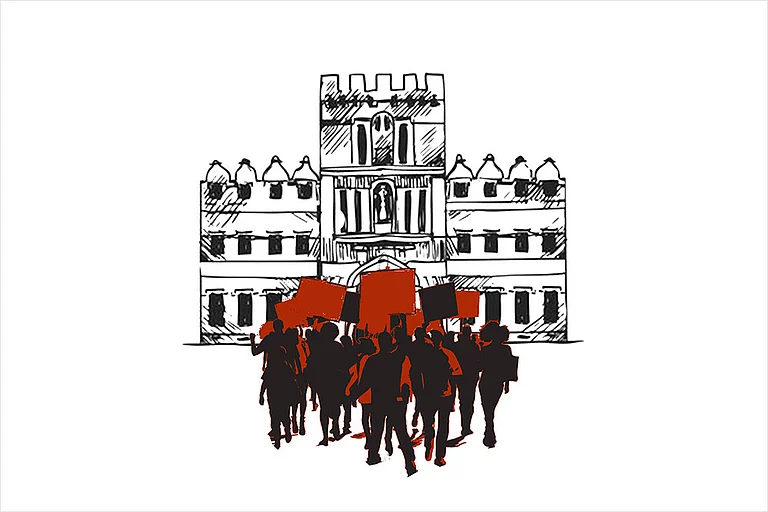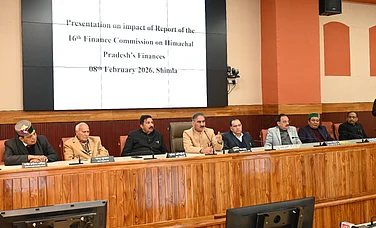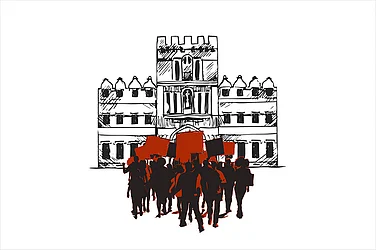With the Delhi government lifting all curbs related to COVID-19, the light is finally appearing at the end of the tunnel for businesses in the national capital that suffered unprecedented losses in the past two years due to the pandemic. Business owners and trade associations are expecting March to be a strong recovery period as restaurants, bars, cinemas and other establishments resume regular operations. The several waves of the pandemic took a heavy toll on economic activities in the capital as well. Malls, restaurants, cinemas and other businesses were forced to shut down completely for several months. When the COVID-19 cases subsided, the businesses were allowed to open with several restrictions, including 50 percent capacity.
Striking an optimistic note, National Restaurant Association of India (NRAI) President Kabir Suri said they are expecting that 80 to 85 percent of pre-COVID business will be restored in March. There are about 96,000 eateries in Delhi which include both organised and unorganised players. "We are very happy. It has been over two years since we have been dealing with 50 percent capacity. Now, we can operate normally. It is a very positive step by the government. We are thankful for it," Suri said.
He said the last two years have been "disastrous" for restaurants and eateries,but now they are looking forward to a positive response from customers. Business owners in the national capital were demanding the lifting of curbs on activities for quite some time. In its last meeting on Saturday, the Delhi Disaster Management Authority (DDMA) announced that it has decided to lift all COVID-related restrictions from Monday. The announcement means that night curfew is lifted, markets can stay open till 10 PM, and restaurants, bars, cafes, and cinema halls can function at 100 percent seating capacity.
Delhi came under restrictions on March 22, 2020 when a Janata Curfew was implemented owing. On March 24, 2020, Prime Minister Narendra Modi announced a lockdown across the country which shut almost everything other than essential services. "I think we should see March as a strong recovery period. A minimum of 80 to 85 percent of pre-COVID business should be achieved in this period," Suri added.
Atul Bhargava, who heads the New Delhi Traders Association, said they are expecting a recovery of businesses in the next one or two months if there are no further hiccups as people are keen to venture out. "With the restrictions gone, we will get a chance to make up for the losses suffered in the last 20 months."
"It will take another one or two months if all is well. In one or two months, we will hopefully thechieve a pre-COVID sale as people gain the confidence that it is safe to move around. They have been waiting to come out," he added. The entertainment industry was among the worst hit as lockdowns and restrictions meant theatres remained shut for the most part during the past two years. Gautam Dutta, CEO of PVR Limited, said it is an extremely important period for them as some big movies are lined up. "They need to be given their due space in the cinema circuit and audiences should not be denied their share of big-screen experience," he said.
After the second wave, when cases went considerably down last year, cinema halls and multiplexes were allowed to operate with reduced capacity. But the joy was short-lived as they were shut completely during the third wave in December last year. Now, the Delhi government has allowed the operation of theatres at full capacity. “We are happy that the seating capacity and operating hour restrictions have been removed now on a par with all other leisure activities. We can expect to reach pre-COVID levels of performance when conditions normalise, which hopefully should happen over the next 2-3 months,” Dutta added.
As the traffic is expected to increase, the Delhi Metro has also allowed standing passengers in its trains. All gates of metro stations will remain open to facilitate passenger entry throughout the day. Regulation of passenger entry through a limited number of gates stands has been dispensed with from Monday. Taking to Twitter, the Delhi Metro Rail Corporation said it has resumed services on Monday without any restriction on passenger occupancy. "DMRC expresses its thanks & gratitude to its passengers for following protocols during a pandemic. We shall continue to try our best to provide a safe journey in upcoming days," the DMRC said in a tweet. To ensure a safe journey, the DMRC has, however, asked passengers to follow all necessary protocols including wearing masks regularly, adequate social distancing and frequent hand sanitisation. "DMRC expresses its thanks and gratitude to its passengers for following protocols during a pandemic. We shall continue to try our best to provide a safe journey in upcoming days," it tweeted further.
With the lifting of restrictions, many residents say there is a sense of relief despite the lasting impact of the pandemic in several spheres of life and the lingering apprehension of "'another wave". "Delhi is finally getting back to normal after two years. We have witnessed a lot in this period and we all are tired. I am thankful to the Delhi government. Now we can live life normally," said Komal Sharma, a 25-year-old resident of Laxmi Nagar. Himanshu, a 24-year resident of Dwarka, expressed the hope that the cases will continue to decline despite the removal of curbs. "Prudent thing to do considering that cases have been steadily going down. Hope it continues this way. As a student, it will help me because I want to attend offline classes. One is not able to learn much in online classes," he said.
With PTI Inputs


























